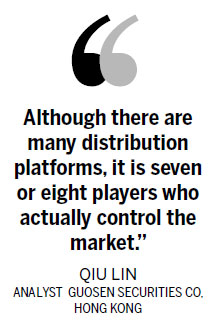Big players rule the mobile gaming turf
Updated: 2013-05-06 07:13
By Chen Limin (China Daily)
|
||||||||
|
A visitor to the 10th China International Digital Content Expo surfing online gaming apps at games.qq.com. The country's top portals, including Tencent Holdings Ltd, Qihoo 360 Technology Co and Baidu Inc, are now active participants in the rising competition for the online gaming market. Provided to China Daily |

Distribution platforms may see flurry of consolidation, say experts
Big players will continue to dominate the mobile gaming turf in the next few years with their rapid market consolidation moves and aggressive marketing strategies, leading industry experts said.
With mobile games continuing to gain in popularity, an increasing number of mobile game distributors, large and small, have now jumped into the fray. In China, they are often seen as the vital market link for mobile game developers because of the huge traffic and number of users these companies have at their disposal.
"For game developers, reaching out to users is more about making use of the far-reaching distribution platforms for marketing purposes," said Xue Yongfeng, an analyst with research company Analysys International.
While Apple Inc's App Store and Google Inc's Google Play dominated mobile application downloads in the United States market, jointly taking up 92 percent in terms of revenues in the first quarter, according to market researcher Canalys, in China, the market is much more fragmented.
There are about 100 mobile distributors in China spread over three main categories: telecom carriers, mobile phone makers and Internet companies that provide game downloads through their mobile applications.
The rapid popularity of mobile games will lead to more mergers and acquisitions among distributors, analysts said.
"Although there are many distribution platforms, it is seven or eight players who actually control the market," said Qiu Lin, an analyst with Guosen Securities Co in Hong Kong.
"Right now the market is still big enough, everyone is growing and there is still a long way for activities such as frequent takeovers," he said.
Chen Xiangyu, chief executive officer of Chinese mobile game publisher iDreamsky, said although big players dominate the gaming market, large distributors still remain "cautious" on M&A activities. IDreamsky is the operator of several hit mobile games in China, including Fruit Ninja and Temple Run.
The big players in the desktop Internet sector can make use of their content, capital and operational experience to gain an edge in the mobile Internet sector, especially companies such as Tencent Holdings Ltd, Qihoo 360 Technology Co and Baidu Inc, all of which have already been outstanding mobile game distributors, he said.
These big players have been spending huge sums of money on mobile Internet services that can possibly strengthen their position as channels to reach a large number of users.
For example, Baidu invested in Zhuo Dashi, a system management tool for the Android platform, late last year. Tencent also bought a Zhejiang-based IT company whose main product is mobile phone management software, in March 2012, according to magazine Business Value.
By the end of last year, China had 430 million mobile Internet users and 56.7 percent of them had downloaded mobile applications from various channels.
Qiu Lin, the Guosen Securities analyst, said distributors would go beyond the role of distribution in the future and expand into more value-added services, such as data analysis and operations to attract more mobile games on their own platforms.
Distributors generate revenues from a break down approach with developers. Users' spending on mobile games goes to both sides, with distributors taking between 30 percent and 50 percent of the total, Qiu added.
As big players step up efforts to cash in on the market, WeChat, a mobile chatting tool developed by Tencent, is being seen as a big challenger because of its huge population of Internet users.
The service has roped in more than 300 million users in less than two years. Distributing mobile games is still the main revenue stream for the popular service, Tencent Chairman Pony Ma said.
However, Cheng Wu, Tencent's vice-president, said earlier last month that the company was yet to finalize the timetable for distributing games through WeChat and was still exploring various ways to do so.
chenlimin@chinadaily.com.cn
(China Daily 05/06/2013 page16)

 Michelle lays roses at site along Berlin Wall
Michelle lays roses at site along Berlin Wall
 Historic space lecture in Tiangong-1 commences
Historic space lecture in Tiangong-1 commences
 'Sopranos' Star James Gandolfini dead at 51
'Sopranos' Star James Gandolfini dead at 51
 UN: Number of refugees hits 18-year high
UN: Number of refugees hits 18-year high
 Slide: Jet exercises from aircraft carrier
Slide: Jet exercises from aircraft carrier
 Talks establish fishery hotline
Talks establish fishery hotline
 Foreign buyers eye Chinese drones
Foreign buyers eye Chinese drones
 UN chief hails China's peacekeepers
UN chief hails China's peacekeepers
Most Viewed
Editor's Picks

|

|

|

|

|

|
Today's Top News
Shenzhou X astronaut gives lecture today
US told to reassess duties on Chinese paper
Chinese seek greater share of satellite market
Russia rejects Obama's nuke cut proposal
US immigration bill sees Senate breakthrough
Brazilian cities revoke fare hikes
Moody's warns on China's local govt debt
Air quality in major cities drops in May
US Weekly

|

|








